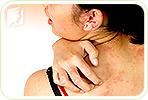With age, many individuals begin to suffer from dry spots on their skin, typically on the lower legs, elbows, and lower arms. These dry patches, or scales, are often itchy and uncomfortable. Low estrogen levels are known to increase frequency and severity of scaly skin, which means that women over 40 years of age who have entered the menopause transition may be more likely to experience this irritating condition. Therefore, it is very helpful for women entering menopause to educate themselves on what scaly skin is, how to prevent it, and how to treat it.
What Is Scaly Skin?
Scaly skin is a term used to describe patches of dead skill cells that have built up on the surface of the skin. Typically, scaly skin appears as dry, silver patches surrounded by reddened skin. Common symptoms include itching, overheating, and pain. While this most commonly occurs on the elbows, knees, and middle of the body, itchy, scaly skin can develop anywhere on the body, including the scalp, palms, and feet.
Specific skin disorders - such as psoriasis, seborrheic dermatitis, and ichthyosis - are all characterized as causing dry, scaly skin. Women who have been previously diagnosed with any of these conditions can expect their symptoms to worsen as their estrogen levels begin to decline at the onset of menopause.
How to Prevent Scaly Skin
Easy lifestyle changes and substitutes can help to prevent the development or spread of itchy, scaly skin. Tips for maintaining healthy, scale-free skin include:
Drinking plenty of liquids - consider drinking warm water to hydrate the skin from within.
Use unperfumed and natural moisturizers - lotions, creams, ointments - every day.
Bathe less often, using warm water rather than hot and mild soaps rather than harsh ones.
Protect your skin from excessively dry air.
Use a humidifier, a machine that adds moisture to the air.
While making these adjustments does not guarantee that you will not experience dry, scaly skin during menopause, they will help to decrease your risk. It can also be beneficial to avoid certain risk factors associated with itchy, scaly skin. Smoking and excessive sun exposure can dry out your skin, increasing the likelihood of scales. Stress can increase the chances of developing scaly skin and worsening it, because stress also often leads to more frequent scratching.
Relieving Scaly Skin
Simple home remedies can help to alleviate the pain and irritation of dry scaly skin.
Applying a cold compress or running cool water over the affected area can help rejuvenate the skin by adding moisture.
Over-the-counter oatmeal products can be added to lukewarm bathwater to soothe and loosen the scales.
All-natural moisturizing creams and lotions can provide antioxidants, including vitamin C and vitamin E, which are known to improve skin health.
As women age and enter menopause, their chances of developing dry, scaly skin significantly increase. Following certain changes in habit can help to prevent scaly skin, but if itchy, scaly skin does appear, home therapies are available. The symptoms and treatments of scaly skin can apply to other itchy skin conditions related to menopause and aging as well, so learning how to identify the skin problem is one step towards treating it.
Sources
- Ceovic, R. et al. (2013). Psoriasis: Female Skin Changes in Various Hormonal Stages throughout Life-Puberty, Pregnancy, and Menopause. BioMed Research International, 6.
- National Institute of Health. (2016). Age Page: Skin Care and Aging. Retrieved November 16, 2016, from https://www.nia.nih.gov/health/publication/skin-care-and-aging
- U.S. Department of Health and Human Services. (2016). Skin and Hair Health. Retrieved November 16, 2016, from https://www.womenshealth.gov/files/assets/docs/the-healthy-woman/skin_hair.pdf
- U.S. National Library of Medicine. (2016). Psoriasis. Retrieved November 16, 2016, from https://medlineplus.gov/ency/article/000434.htm
- U.S. National Library of Medicine. (2016). Seborrheic dermatitis. Retrieved November, 16 2016, from https://medlineplus.gov/ency/article/000963.htm




